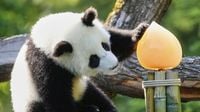Berlin Zoo was abuzz with excitement on Friday, August 22, 2025, as the city’s beloved panda twins, Leni and Lotti, celebrated their very first birthday. The occasion was marked by a festive atmosphere, playful antics, and a menu that would make any panda’s heart flutter: frozen vegetable treats and a candle crafted from bamboo shoots. It’s not every day you see a birthday party thrown for two of the world’s rarest animals, and Berliners—along with panda fans worldwide—soaked up every moment.
The twin cubs, born on August 22, 2024, have captured the hearts of locals and tourists alike since their arrival. According to the Associated Press, the celebration unfolded in the Panda Garden at the Berlin Zoo, where the twins frolicked with their mother, Meng Meng. Photos from the event, curated by AP photo editors, showed the cubs tumbling around, playing with a large red wooden number one, and exploring their birthday treats with infectious curiosity.
Leni and Lotti aren’t just any pandas—they’re the second pair of giant panda twins ever born in Germany. Their birth was hailed as a triumph for the zoo, which has invested years of care and expertise into its panda program. The twins weighed less than 200 grams (about 7 ounces) each at birth, but after a year of attentive nurturing, they now tip the scales at a healthy 21 kilograms (46 pounds) apiece. That’s quite a leap, and a testament to the dedication of their caretakers.
Each cub was given both a Chinese and a German name—a nod to the international significance of their species and their home in Berlin. Officially, they’re Meng Hao and Meng Tian, but they’re far better known as Leni and Lotti. The names themselves are tributes: Leni honors Berlin native and legendary actress Marlene Dietrich, while Lotti is a salute to the city’s Charlottenburg district. It’s a subtle but heartfelt way for Berliners to claim these pandas as their own.
The birthday party itself was a delight. As reported by the Associated Press, the twins were treated to what the zoo described as “ice marbles” made from beetroot and carrot juice. These chilly snacks were a playful twist on the traditional birthday cake, and seemed to be a hit with the birthday girls. To top it off, a candle made from bamboo shoots was added to the mix—because, after all, what’s a panda party without bamboo?
But beyond the treats and toys, it’s the personalities of Leni and Lotti that have truly endeared them to the public. According to zookeepers cited by AP and other outlets, Lotti is the more daring of the two, always first to explore new things and quick to dive into adventure. Leni, on the other hand, is described as more laidback, preferring to observe before joining in the fun. These character differences have made it easy for visitors to tell them apart and have sparked no shortage of debate over which cub is the crowd favorite.
The twins’ story is also a chapter in a larger panda saga unfolding at the Berlin Zoo. Their parents, Meng Meng and Jiao Qing, arrived in the German capital in 2017 as part of a cooperative agreement with China—a country that famously regards its giant pandas as living treasures. The arrival of the adult pandas was big news at the time, and hopes were high that they would produce offspring. Meng Meng and Jiao Qing didn’t disappoint: their first pair of cubs, Meng Xiang and Meng Yuan (better known by their German names, Pit and Paule), were born in August 2019.
Pit and Paule quickly became star attractions in Berlin, drawing crowds eager to catch a glimpse of the playful brothers. Their popularity was such that their eventual departure—contractually agreed upon from the start—was met with both celebration and sadness. The elder brothers were flown to China in late 2023, a move delayed by the COVID-19 pandemic but inevitable due to international breeding agreements. Their journey marked the end of an era for Berlin Zoo, but also paved the way for Leni and Lotti to step into the spotlight.
The presence of giant pandas at Berlin Zoo is more than just a novelty; it’s a symbol of international cooperation and a testament to the city’s commitment to conservation. Giant pandas are classified as vulnerable, with only around 1,800 left in the wild, according to the World Wildlife Fund. Every successful birth in captivity is a small but meaningful victory for the species. The Berlin Zoo’s achievements in panda breeding have not gone unnoticed—both by the scientific community and by panda enthusiasts around the world.
The birthday bash for Leni and Lotti was as much a celebration of hope as it was a party for two adorable cubs. As the twins played under the watchful eye of their mother, Meng Meng, and the delighted gaze of visitors, it was easy to forget the challenges that come with breeding and raising giant pandas. The species is notoriously difficult to breed in captivity, and every milestone—like a first birthday—is the result of meticulous care, patience, and a bit of luck.
For Berliners, the twins have become a point of civic pride. Their names, their antics, and even their favorite snacks are the subject of local conversation. And for the keepers who know them best, Leni and Lotti are individuals with distinct quirks and preferences—a reminder that, even among endangered species, every animal has its own story to tell.
As the sun set on their first birthday, Leni and Lotti seemed blissfully unaware of their celebrity status. For them, it was just another day of play, exploration, and family. But for those who gathered at the Panda Garden, and for panda lovers watching from afar, it was a day to remember—a celebration of life, resilience, and the special bond between Berlin and its remarkable panda family.
With their first year behind them, Leni and Lotti are poised to become the next stars of Berlin Zoo, carrying forward a legacy that blends conservation, community, and a touch of panda magic.



